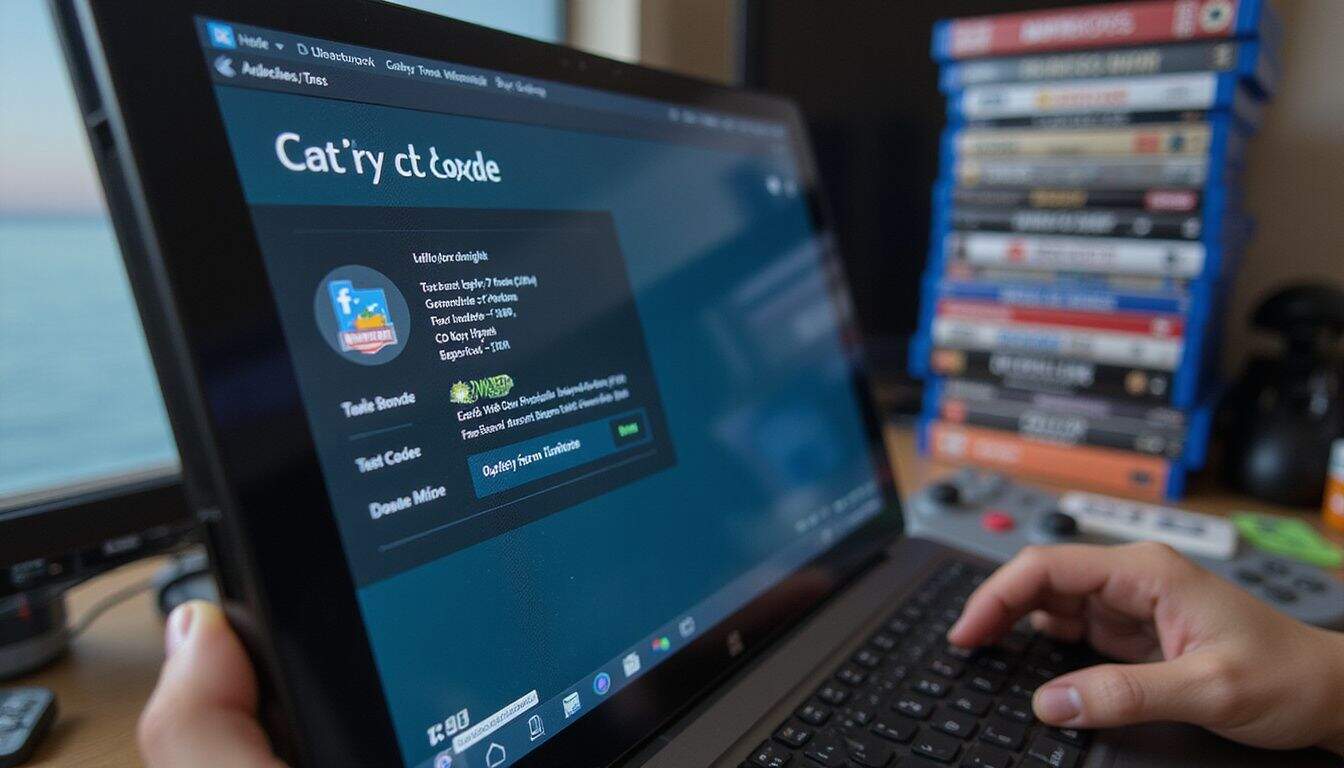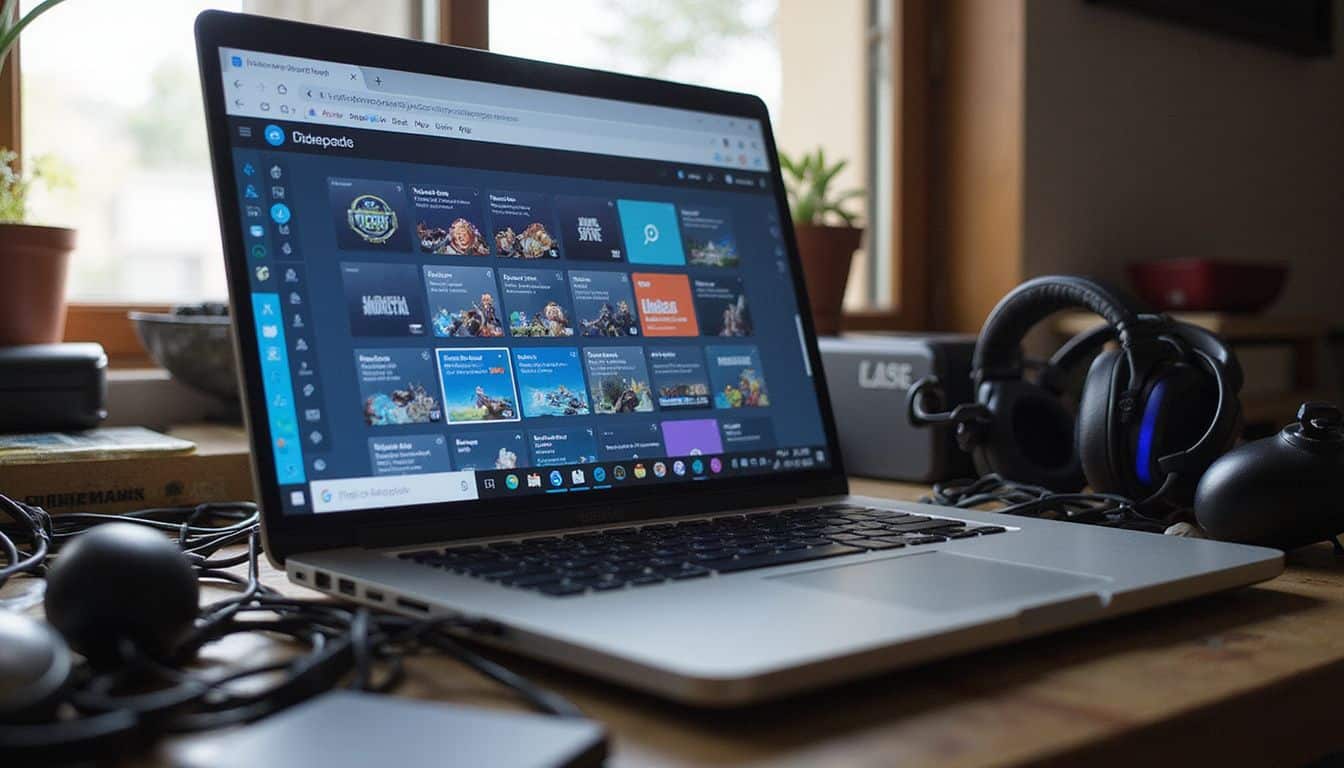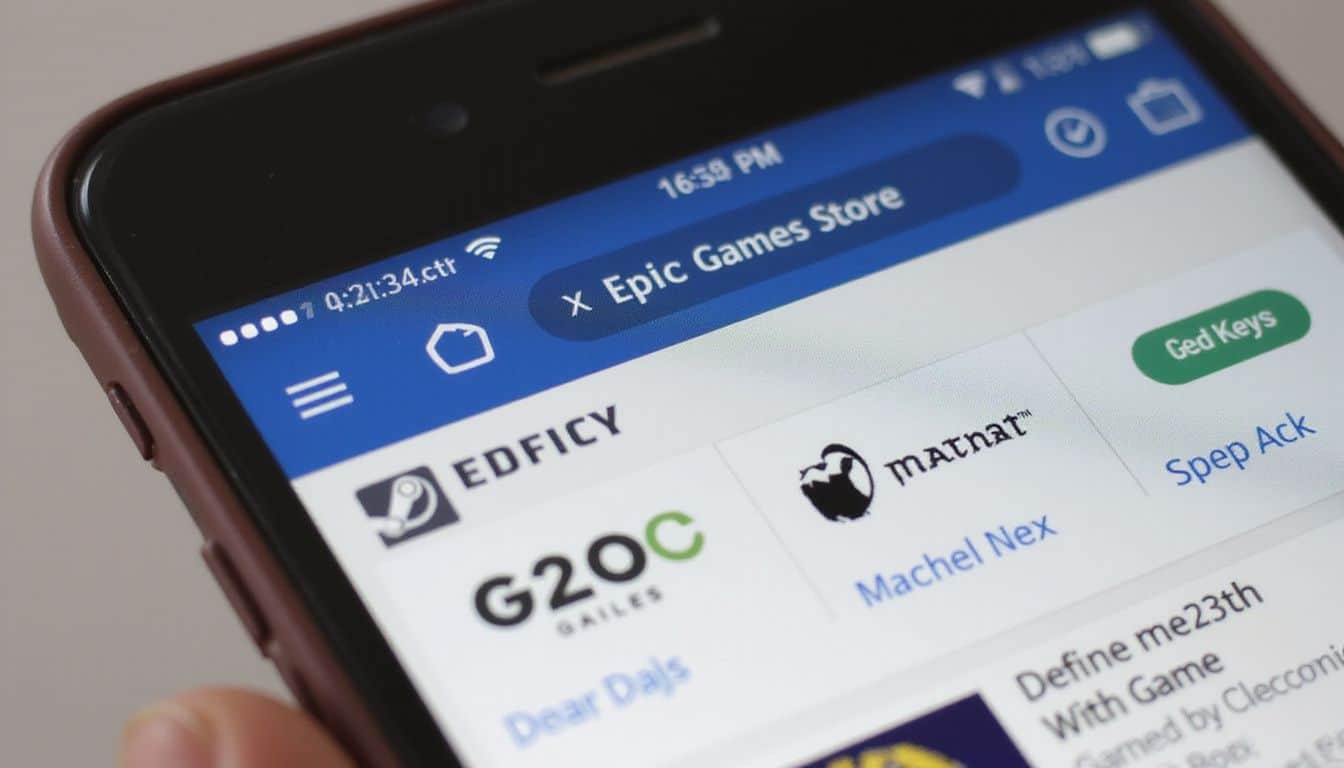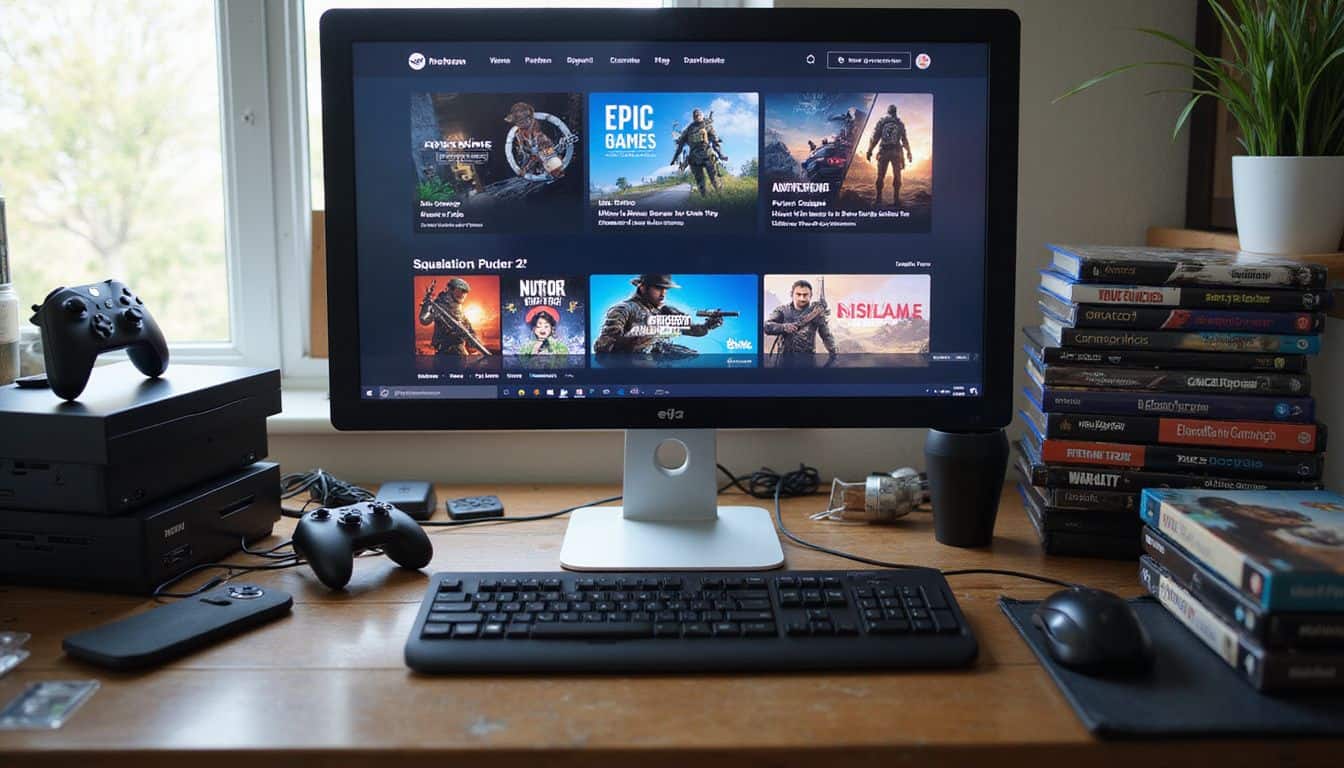Are you tired of paying high prices for video games at retail stores or online platforms? Video game keys are unique codes issued by developers and used to activate digital copies through platforms such as Steam, Xbox Store, PlayStation Network, and Nintendo eShop.
This blog will clearly explain what are video game keys, how they work on consoles and PC games, where to safely buy cheap game keys—and even tips to avoid risks from cybercriminals.
Keep reading if you want more value for your money.
Key Takeaways
Video game keys are unique codes that grant access to digital games on platforms such as Steam, Epic Games Store, or gaming consoles—no physical disc needed.
You can grab these keys from official sites like Steam or through cheaper third-party options such as CDKeys and G2A, where discounts can be pretty significant.
Buying game keys is legal, but be cautious with some third-party sellers—they occasionally sell shady keys that might later get revoked.
Digital Rights Management (DRM) technology checks and confirms your key, tying the purchased game directly to your online gaming account.
Gaming industry specialists say that by 2025, digital licenses and subscription services will take over the market, making physical game copies rare collector’s items.
Table of Contents
What Are Video Game Keys?

So now that gaming access feels so important, let’s talk about the actual magic behind digital game keys. These keys are special alphanumeric codes; they unlock your digital games on platforms like Steam, Origin, or the Epic Games Store.
Each unique code works as your proof of purchase, giving you the license to play each specific game. Think of them as digital tickets—you won’t need physical discs anymore. Most PC games now rely on these codes, and plenty of console titles do too.
Game key websites provide these codes at way cheaper prices than official gaming stores. Websites like G2A match buyers with sellers who’ve purchased keys in massive bundles at deep discounts.
Digital keys have transformed gaming from a physical product to an accessible service available anywhere, anytime.
All these keys stay totally legit because they originally come straight from developers and game publishers. It creates a handy secondary market—gamers can easily score deals from major game studios like Electronic Arts, CD Projekt, and more.
The game keys discount model succeeds since wholesalers buy huge amounts, then pass along savings to customers.
How Do Video Game Keys Work?

Game keys work like digital locks that need the right code to open your games. You’ll need to enter these codes on platforms like Steam, Epic Games Store, or Origin to add games to your account.
Activation process

Activating your digital game keys is simple—each gaming platform follows similar steps. Here’s a quick, easy breakdown for Steam, Epic Games, Xbox Live, PlayStation Store, and more:
- Log into your account on the gaming service you’ll use, such as Steam, Xbox Live, PlayStation Store, or Epic Games.
- Locate the “Activate a Product” or “Redeem Code” prompt, usually in the account menu or the store section.
- Enter your specific activation key exactly as provided—always including dashes or special symbols.
- Press the activation or redeem button; the system then checks your key against its digital rights database.
- After activation succeeds, your game immediately begins downloading.
- For Steam specifically, open the top menu labeled “Games”, and choose the “Activate a Product on Steam” option.
- If you’ve received a Steam gift link, just click it from your browser and confirm the gift to add it to your collection.
- Buyers from CDKeys.com can find their activation codes clearly displayed on the website’s “Orders” page.
- Third-party sellers, such as Humble Bundle, typically provide simple step-by-step activation instructions for each game.
- Occasionally, additional sign-ups might be needed—for example, accounts with publishers like Ubisoft Connect (formerly Uplay) or platforms such as GOG.com.
- Console-based activation codes usually must be redeemed directly within your console’s online storefront rather than on a PC.
- Most digital game stores support multiple payment types: credit and debit cards, PayPal, or online wallet services.
Platforms that use game keys

Game keys today easily work across many popular gaming platforms, but each platform has its own unique system for redeeming and managing digital licenses.
- Steam remains the leader as the most popular PC gaming platform using game keys. Valve’s marketplace lets you quickly redeem games into your account by entering a simple code.
- Electronic Arts runs Origin, which offers game keys for popular titles like Battlefield and The Sims. Redeeming keys through their desktop app is easy and user-friendly—from my experience, at least.
- Ubisoft Connect, formerly Uplay, relies on game keys for major games like Assassin’s Creed and Far Cry. Your redeemed games automatically link to your Ubisoft account, making it easy to find and play them.
- GOG.COM takes a different approach by offering DRM-free games through game keys. That means once redeemed, you fully own your games, without having to check in online or deal with copy protection.
- Epic Games Store provides its own game key system, and they’re known for regularly giving away free titles, which stay permanently in your account library.
- Microsoft Store issues game keys valid for both Xbox and PC games under one unified user account. Even their Game Pass subscriptions involve using these digital keys.
- PlayStation Store and Nintendo eShop both support redeeming keys directly on their platforms. Your games become linked immediately to your console’s specific account.
- Humble Bundle offers keys redeemable on different platforms, and part of each sale goes to charity. They often have attractive bundles at discounted prices.
- K4G runs a marketplace connecting buyers and sellers who trade digital game keys across many gaming platforms.
Game keys differ from one platform to another—in format, security checks, and protection measures—to help reduce the risk of fraud.
Types of Video Game Keys

Video game keys come in different forms based on how they’re used and sold. Game makers create unique types to fit various sales methods and protect their products from theft.
CD keys
 CD keys are special codes that give you access to physical CD-ROM games. Think of an alphanumeric code as your personal digital pass, providing instant entry to the games you’ve bought.
CD keys are special codes that give you access to physical CD-ROM games. Think of an alphanumeric code as your personal digital pass, providing instant entry to the games you’ve bought.
I’ve used these keys since the early 2000s, watching them gradually become commonplace in gaming circles. Gamers today often say “CD key” or “game key”, even though actual discs are no longer standard.
The right key opens more than just a door—it unlocks entire digital worlds.
These codes are checked by digital rights management (DRM) systems to confirm you own the game. Major platforms, including Steam and Origin, ask users to enter valid CD keys before downloading or playing certain games.
Online retailers, such as CDKeys, often have huge discounts—sometimes slicing prices by up to 90%. Buying games this way can cut the cost of filling your digital shelves far below standard prices at official online vendors.
Digital licenses

Digital licenses form the foundation of modern gaming. Unlike physical game copies, digital licenses grant you the right to use software based on certain rules. They determine how many times you can install your game, create backup copies, or access available updates.
Think of these licenses as virtual agreements—contracts between you and the game’s publisher. Most licenses connect directly to your account on platforms like Steam and Epic Games Store, rather than your specific device.
This arrangement helps publishers protect copyrights, yet still lets you download your favorite games across multiple computers.
To enforce licensing rules, gaming companies rely on Digital Rights Management (commonly known as DRM). Rules differ widely from one publisher or platform to another. For example, some platforms permit family sharing, but others restrict gameplay strictly to a single account.
Today, digital licenses dominate computer gaming, largely replacing physical game discs. Console gaming still offers a choice between digital copies and physical discs. Next, we’ll explore the best places online to purchase digital keys—and a few things you need to watch closely.
Where Can You Buy Video Game Keys?

Gamers can find video game keys from many places online. Steam, Epic Games Store, and GOG sell official keys, while sites like G2A and CDKeys offer cheaper options.
Official platforms

Official stores like Steam, Epic Games Store, and Origin provide game keys straight to players. These platforms offer the safest way to grab digital games—zero risk of scams or fake keys.
Last month, I purchased a Minecraft: Java key from Microsoft’s official store, activated it instantly, and had no problems at all.
Most legit gaming sites link directly to your digital wallet or take credit cards, making checkout quick and easy. Steam, the biggest platform for PC games, currently hosts more than 50,000 titles—and delivers keys instantly.
CDKeys.com works closely with game publishers, which helps them offer lower prices while staying completely reliable. You can sort through games by genre, price, and specific platform on their website, easily finding what you’re after.
With over one million followers across their social media channels, these official platforms clearly have the gaming community’s trust.
Third-party sellers
Third-party sellers often provide game keys cheaper than official stores do. Sites such as Humble Bundle, Green Man Gaming, and Fanatical offer authentic keys—with some Steam support included.
These marketplaces receive keys straight from developers or approved suppliers, so they’re usually safe bets. But some resellers don’t follow the rules, selling keys from sketchy sources instead.
Purchasing from shady sites like these puts gamers at risk. If developers don’t receive proper payment, these unofficial keys can get revoked without warning. To stay safe, savvy buyers rely on helpful tools—like www.isthereanydeal.com—to compare prices and identify trustworthy sellers.
The online game key market is full of choices and attractive deals, so shoppers should be cautious and aware of potential scams.
Now, let’s figure out if buying game keys through these marketplaces is legal—or if it could land you in trouble.
Are Video Game Keys Legal?

Yes, buying and using game keys is completely legal. Most platforms sell codes directly from game developers or publishers themselves. Many gamers get anxious about buying from sites like G2A or Kinguin, but there’s really nothing to worry about.
Actually, these digital marketplaces operate legally, allowing sellers to compete by offering lower prices. That competition means you can snag popular computer games without always paying full price—pretty awesome, right?
The sellers offering these keys include retailers, wholesalers, game publishers, and even regular gamers like you and me. I bought a key once from a third-party website for a popular console title at about half the usual cost.
Activating it through the official platform was no trouble at all, and the DRM worked perfectly—just like one bought at a retail store.
Game key platforms work just like other online shops. You buy keys using credit cards or other online payment methods, all straightforward stuff. Some even offer gift cards, allowing you to pick your games later on.
The main takeaway here is that these stores aren’t shady or suspicious—they’re simply part of the modern gaming landscape. Most complaints about key-selling websites come down to simple confusion over how things actually work, not legal trouble.
Risks Associated With Buying Game Keys

Buying game keys from unofficial sellers can be risky—and costly. Scammers set up counterfeit websites offering keys that either don’t exist or never work. Your credit card payment might process just fine, but nothing arrives in your inbox.
Public online stores often list resold or invalid keys that won’t activate properly on your gaming system. Even worse, shady checkout pages may secretly swipe your personal details, putting your online payments in danger.
Another scam involves ready-made accounts. Sellers of these accounts often take them directly from real gamers who didn’t secure their logins. You might pay carefully for software or e-books, then suddenly lose access because the original owner recovers the account.
The safest option is always buying from trusted platforms with strong DRM security.
The way digital keys work may soon shift in big ways. Digital distribution services could shift to more secure, advanced codes, blockchain verification, or cloud-linked accounts. Big-name publishers might lean toward subscriptions or cloud-streaming access, skipping keys altogether.
Whatever happens next, trusted platforms and official channels remain your best protection for secure, hassle-free gaming.
How Will Video Game Keys Evolve in 2025?

Game keys will undergo major shifts in 2025, as gaming continues to expand. Digital rights management (DRM) systems should become easier for users, while still keeping games safe from piracy.
Physical copies might become rare collectibles—digital licenses will dominate completely. Plenty of players already handle their online libraries smoothly and know how to refund a Steam game anytime they want.
Indie titles gaining popularity could lead to simple keys that work smoothly across different platforms. Software companies are already working on new ways to prove game ownership without traditional keys at all.
Console companies might shift to subscription models, dropping traditional single-purchase keys altogether. Improved card payment security will cut the risk of online fraud, making transactions safer for everyone.
Smart, shareable key systems could even let you lend games briefly to friends without breaking any rules. The gaming industry expects these updates to simplify game access and reduce piracy at the same time.
Players can also look forward to improved key mapping, letting them easily assign actions to convenient keys.
People Also Ask
What are video game keys and how do they work?
Video game keys are special digital codes you can use to unlock games on your computer or gaming console. They connect with Digital Rights Management (DRM) systems, which check to confirm you own the game before allowing it to run.
Are game key sites safe to use for buying games?
Most large and well-known game key websites are usually safe—but always check customer reviews before buying. Pay with a card offering buyer protection, and pick websites that provide easy refunds if your key isn’t valid.
Can I use the same game key on different devices?
No, game keys usually tie to just one platform. Keys meant for consoles only work on the specific console brand, like PlayStation or Xbox. PC keys only unlock games designed specifically for computers.
Why are some game keys cheaper on certain websites?
Prices sometimes vary due to differences in region-based pricing or wholesale buying deals. But be cautious with extremely low-cost keys—they might come from unofficial sources without proper authorization.
